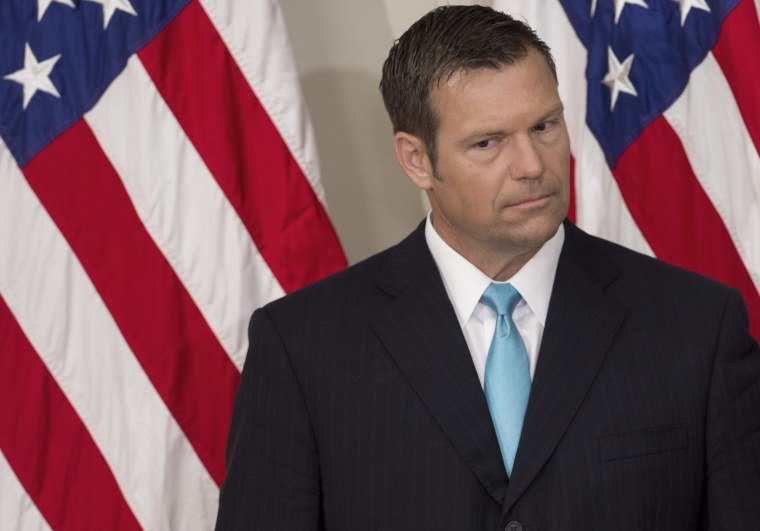The co-chairman of President Donald Trump’s vote fraud commission on Wednesday cast doubt on the 2016 election results, saying he was unsure how many votes Hillary Clinton or Trump received due to the possibility of fraud.
“You know, we may never know the answer to that,” said Kris Kobach, the Kansas Secretary of State, who serves on Trump’s Presidential Commission on Voter Integrity, after he was asked by MSNBC’s Katy Tur whether he thought Clinton “won the popular vote by 3 to 5 million votes.”
“We will probably never know the answer to that question,” he added.
Clinton won the popular vote in the 2016 election by approximately 2.87 million votes. According to the certified Federal Election Commission records, Clinton received 65,853,516 votes and Trump got 62.984,825.
Kobach did not provide any evidence to support his statement. There have been no instances of widespread fraud reported in last year's election.
When Tur followed up with, “How do you say we may never know the answer to that question?” Kobach explained his rationale:
“What I'm saying is, let's suppose that the commission determined that there were a certain number of votes cast by ineligible voters. You still won’t know whether those people who were ineligible voted for Trump or for Clinton or for somebody else.
“And so, it's impossible to ever know exactly, if you took out all the ineligible votes, what the final tally would be in that election,” he added. “You can obviously, based on the data, you can make some very educated guesses.”
Kobach then admitted that some of the votes Trump received in November could be called into question, too.
“So are the votes for Donald Trump that led him to win the election in doubt as well?” Tur asked.
“Absolutely,” Kobach said.
Trump won the Electoral College vote, and thus, the presidency.
Nevertheless, he spent the weeks following his win claiming he would have won the popular vote if it weren’t for voter fraud.
“In addition to winning the Electoral College in a landslide, I won the popular vote if you deduct the millions of people who voted illegally,” he tweeted Nov. 27.
Then, days after he was sworn in, he vowed a major investigation into the millions of "illegal" votes he claimed cost him the popular vote to Clinton.
Trump has, in the months since, repeated those unfounded claims about rampant voter fraud during the 2016 election and has insisted that the system was "rigged" against him.
But even Trump appeared to back off those claims on Wednesday, when he spoke at the first public hearing of his commission, where he raised the possibility that substantial voter fraud had occurred in the 2016 election, but did not repeat past claims that millions of illegal ballots were cast.
"This issue is very important to me because throughout the campaign, and even after, people would come up to me and express their concerns about voter inconsistencies and irregularities, which they saw," Trump said. "In some cases, having to do with very large numbers of people in certain states.”
Experts have repeatedly said that voter fraud is extremely rare.

